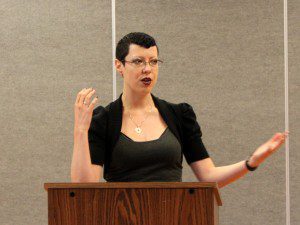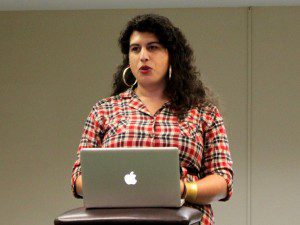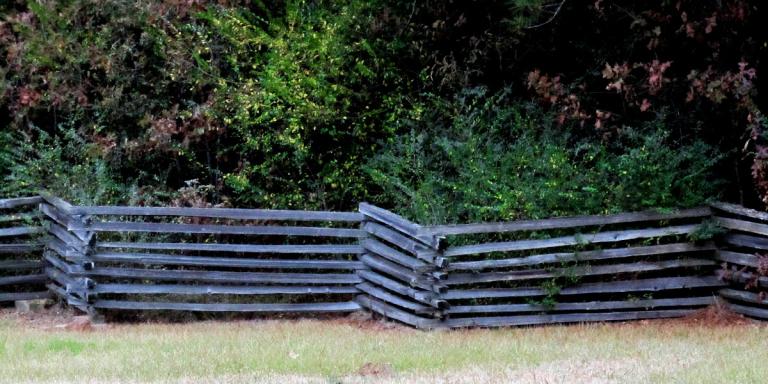Most of us prefer order to chaos. Order brings predictability and gives us a firm foundation from which we can plan and build. Order brings comfort, it lets us feel like we understand who we are, and it reminds us of the value society tells us we have (which often has little correlation to our inherent value and worth).
But left unchallenged, order can be stagnating and suffocating. It can stifle innovation and block needed changes. And it can crush individuals in the name of conformity and compliance.
I heard several variations on this theme at Many Gods West. In presentation after presentation, conversation after conversation, people asked “who gets to set the boundaries?” “Whose opinions set the norms of society?” And perhaps most relevantly, “how do those of us who are excluded by the mainstream’s boundaries and norms respond?”

Sobekneferu’s presentation was “Winning the War: Worshiping Deities Whose Mythology Was Written by Their Antagonists.” Long before I began exploring Paganism, I learned that the Celtic myths weren’t written down till the Christian era. This certainly isn’t an ideal situation, but Druids and other Celtic-influenced Pagans have been able to work around it. We have it easier than some – there is some truth to the old saying “the Gods of the old religion become the devils of the new.”
What do we do when the powerful either defame or neuter our Gods? The Gods are perfectly capable of defending Their own honor – I’m more concerned with the effects of that defamation on us. It’s tiring and distracting to have to constantly respond to accusations that “you’re worshipping an evil God.” It’s equally tiring to have to deal with friends who constantly say “your Gods aren’t real.”
The powerful – including those whose power simply comes from their numbers – set the boundaries and everything is either “like them” and good or “not like them” and therefore bad and probably forbidden. How do those of us who simply aren’t like them deal with this?

Elena Rose’s presentation was “Loving Our Monsters.” She asked “ what do you do when society insists you’re a monster?” – when they insist that because of who and what you are, you’re inherently dangerous. Sometimes they go so far as to say that killing the monster – you – is justified. Elena reminded us that even monsters have families, ancestors, and Gods. And perhaps most importantly, we don’t have to identify with those who come to hunt us.
While it is helpful to remember our common origins in the Big Bang and evolution, and our common destiny on the Earth, dividing ourselves into groups based on backgrounds, experiences, and interests is a universal human practice. Polytheists understand this well: different Gods call different people to worship Them in different ways. Yet experience tells us it’s far too easy to go from “this way is best for me” to “this way is best for everyone” to “other ways are evil and must be stopped.” The more different and especially the more unknown a person or group is, the easier it is to assume the worst about them.
The pressure to not be different is immense. Some LGBT people are still in the closet; many Pagans are still in the broom closet, at least in some circles. I know several teenagers who abandoned their religion of birth because it was easier to get along if they were Christian. Resumes with “black sounding” names get trashed far more frequently than those with names that sound like their ancestors came from the British Isles. The poor are assumed to be lazy or stupid or both. Young black men are assumed to be thugs, Muslims are assumed to be terrorists, and the sad list goes on and on and on.
Who decided we were all supposed to be straight white middle-class Christians (or at least act like them)? And more importantly, what are those of us who are not or have no desire to be some or all of those things to do?
Sometimes we demand to be let in. The fight for marriage equality is about acknowledging the validity of same sex marriages and about making the societal benefits of the institution of marriage available to same sex couples.
Sometimes we demand the system reform. Black Lives Matter is about demanding law enforcement stop harassing and killing People of Color.
Sometimes we reform the system from within. Those of us who are part of privileged groups have an obligation to use our privilege to remove barriers, open doors, and offer a welcoming hand to those who’ve been kept out.
Sometimes we create our own spaces: organizations, places, and gatherings where we can drop our guard and be who we are without reservation. This is the primary reason I enjoy going to Pagan gatherings… and the more narrowly-defined the gathering, more unguarded I can be.
When we create our own spaces, we who are used to being on the wrong side of boundaries find ourselves in the unfamiliar position of boundary makers. Draw the boundaries too broadly or too vaguely and our space is not our own. Draw them too narrowly or too rigidly and we may exclude some who are more like us than not or who could be valuable allies. Getting it right is hard. I can offer no sage advice on how to draw boundaries, other than to do it mindfully and compassionately.
 A casual look around the Pagan and polytheist communities reveals a greatly disproportionate number of people who have been marginalized, excluded, called monsters, and physically attacked as monsters by the boundary-makers of the mainstream society. Some of our transgressions against these arbitrary norms are loud and visible, while others are subtle and hidden – sometimes hidden even from ourselves.
A casual look around the Pagan and polytheist communities reveals a greatly disproportionate number of people who have been marginalized, excluded, called monsters, and physically attacked as monsters by the boundary-makers of the mainstream society. Some of our transgressions against these arbitrary norms are loud and visible, while others are subtle and hidden – sometimes hidden even from ourselves.
And yet, these are the people the Many Gods have chosen to restore Their worship. These are the people They have called to live by Their values and embody Their virtues in a world that desperately needs its values rearranged.
Are we laying the foundations for a future where Pagan and polytheist practices are the new norm? I hope we are – I love big projects and big movements that make big changes. But perhaps we’re simply building small, strong, cohesive communities that will honor the Gods and care for each other while the mainstream society crumbles under its own unsustainable weight. I don’t know – my crystal ball isn’t that good.
I’ve spent my whole life trying to figure out where the boundaries are and how to navigate them. It’s a useful skill, but it’s a miserable way to live – and it took me far too many years to accept I would never be happy trying to be who and what society said I “should” be.
Here, in the service of the Forest God, the Lady of the Waters, and other Many Gods; and in the company of this often-frustrating but always beautiful group of Pagans, polytheists, and other assorted folks who insist on setting their own boundaries, I’ve found a home.















